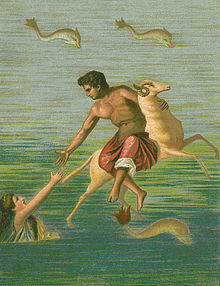Helle (/ˈhɛli/; Ancient Greek: Ἕλλη, romanized: Héllē), or Ellie, sometimes also called Athamantis (Ancient Greek: Ἀθαμαντίς, "daughter of Athamas"), was a character in Greek mythology who figured prominently in the story of Jason and the Argonauts. Helle is known for giving her name to the strait of Hellespont ("sea of Helle"), in which she fell while crossing it along with her brother Phrixus.
| Helle | |
|---|---|
Boeotian princess and Eponym of Hellespont | |
| Member of the Athamantian Royal House | |
 Phrixus and Helle (after a fresco from Pompeii) | |
| Other names | Athamantis |
| Abode | Athamantis in Boeotia later Colchis |
| Genealogy | |
| Parents | Athamas and Nephele |
| Siblings | |
| Consort | Poseidon |
| Offspring | |
Mythology
editPhrixus, son of King Athamas of Boeotia and the half-nymph Nephele, along with his younger sister, Helle, were hated by their stepmother, Ino. Ino hatched a devious plot to get rid of the children, roasting all the town's crop seeds so they would not grow. The local farmers, frightened of famine, asked a nearby oracle for assistance. Ino bribed the men sent to the oracle to lie and tell the others that the oracle required the sacrifice of Phrixus.
Yet before he was killed, Phrixus and Helle were rescued by a flying golden ram sent by Nephele, their natural mother. For reasons unknown, Helle fell off the ram into the Hellespont (which was subsequently named after her) and either drowned or was rescued by Poseidon[citation needed] and turned into a sea-goddess, but Phrixus survived all the way to Colchis, where King Aeetes took him in and treated him kindly, giving Phrixus his daughter, Chalciope, in marriage. In gratitude, Phrixus gave the king the golden fleece of the ram, which Aeetes placed in a consecrated grove, under the care of a sleepless dragon.
With the Greek god Poseidon, Helle was the mother of the giant Almops and Paeon (called Edonus in some accounts).[1][2]
Notes
edit- ^ Bell, Robert E. (1991). Women of Classical Mythology. ABC-CLIO. pp. 230. ISBN 0-87436-581-3.
- ^ Smith, William (1867). "Paeon". In William Smith (ed.). Dictionary of Greek and Roman Biography and Mythology. Vol. 3. Boston: Little, Brown and Company. p. 83.
References
edit- Bell, Robert E., Women of Classical Mythology: A Biographical Dictionary. ABC-Clio. 1991. ISBN 9780874365818, 0874365813.